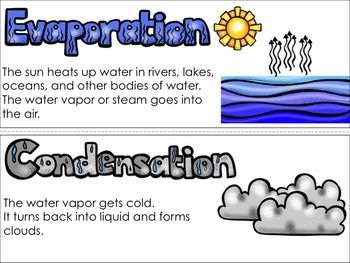Definition Of Liquid Evaporation
Evaporation is a form of vaporisation that usually happens on the surface of liquids and it involves the transition of the liquid particles into the gaseous phase. Evaporation refers to the physical change of matter from liquid to gas.

Infographic States Of Matter Kids Discover States Of Matter Matter Science Matter For Kids
From Latin evaporation the evaporation is the action and effect of evaporating or evaporating.

Definition of liquid evaporation. The change by which any substance is converted from a liquid state into and carried off in vapor specifically. Remote sensing approaches to measure evaporation ET combine observable inputs to the energy and water balance within statistical or process-based methodologies. Medical Definition of evaporation.
Evaporation and condensation Liquids and gases can be changed from one state to another by heating or cooling. The conversion of a liquid into vapor in order to remove it wholly or partly from a liquid. Evaporation may be defined as an operation whereby a fluid changes from the liquid state into the vapor state.
Evaporation is widely used in industry and everyday life. Here evapotranspiration is defined as the water lost to the atmosphere from the ground surface evaporation from the capillary fringe of the groundwater table and the transpiration of groundwater by plants whose roots tap the capillary fringe of the groundwater table. Evaporation of water from the Earths surface into the atmosphere is central to the terrestrial energy water and carbon cycle.
Evaporation is the phase transition of any liquid into a vapor or gaseous state. Condensation is the change of state from a gas to a liquid. The banner at the top of this page offers an even more simple definition.
In summer the sun can generate outdoor temperatures of 95F to 120F providing very fast evaporation of water. Therefore this process is said to involve a change in the state of matter of liquids. Evaporation is the process by which water is converted from its liquid state to the gaseous state also known as water vapor.
It can be easily visualized when rain puddles disappear on a hot day or when wet clothes dry in the sun. During the process physical called evaporation a liquid substance slowly and gradually passes into a gaseous state once it has acquired the energy needed to increase its surface. Condensation is the change of state from a gas to a liquid.
Evaporation happens on a. Definition of Evaporation Evaporation is a process in which water changes from a liquid state to a gaseous state. The evaporation of water is the simplest example that each person encounters while making a tea for instance.
The surrounding gas must not be saturated with the substance which is evaporating. As the temperature increases the rate of evaporation increases. Evaporation happens when a liquid turns into a gas.
The rate of evaporation keeps increasing as. In these examples the liquid water is not actually vanishingit is evaporating into a gas called water vapor. The vapor coming from the tea is the water that has passed from a liquid state into a vaporous one.
Some particles in a liquid always have more kinetic energy than the others. Evaporation is the conversion of a liquid to its vapor below the boiling temperature of the liquid. While the boiling temperature of the water is 100 degrees Celsius it evaporates at 0 degrees Celsius very slowly.
This verb for its part refers to the transformation of a liquid into vapor. Ice cover prevents evaporation of water from the lake surface. The process of liquid changing into vapours even below its boiling point is called as evaporation.
This is an endothermic process thus requiring energy for the molecules to overcome the intermolecular forces of the liquid. In other words water leaves the Earths surface and enters the. Evaporation is when a liquid changes to a vapor caused by an increase in temperature andor a decrease in pressure.
Heat can turn a liquid into a gas and cooling can cause a gas to turn to a liquid. As the temperature increases the rate of evaporation increases. Evaporation is the conversion of a liquid to its vapor below the boiling temperature of the liquid.
ɪˌvæpəˈreɪʃ ə n evaporation noun U BECOMING GAS the process of a liquid changing to a gas especially by heating.

Definition Of Evaporation Define Evaporation Physics Dictionary Physics Gcse Science Evaporation

Water Cycle Vocabulary Cards Water Cycle Vocabulary Cards Water Cycle Project

Evaporation Evaporation Science Flashcards Kindergarten Science

What Is Evaporation Evaporation Liquid Energy Gas Energy

Bbc Digger And The Gang Teachers Worksheets Evaporation Science Worksheets Matter Science

Definition Distillation Evaporation Definitions

Water Has Been Cycling Around Through And Above The Earth For Billions Of Years Learn About How Water Changes From Solid To Liq Evaporation Water Water Cycle

States Of Matter Clip Art Matter Picture Sort Liquids Solids Gas 3 Matter Sort Matter Science States Of Matter Science Fair

What Are The Six 6 Main Factors That Affect Evaporation Water Cycle Evaporation Primary Science

Factors Affecting Evaporation Evaporation Process Fsc Chemistry Phy Evaporation Chemistry Chemistry Lessons

What Is Evaporation Evaporation Chemistry Molecules

Evaporation And Condensation Grade 2 Science Evaporation Smart School

Vapour Pressure And Boiling Point Chemistry Class Boiling Point Vapor

Sc 3 P 9 1 Describe The Changes Water Undergoes When It Changes State Through Heating And Cooling By Using F Elementary Science Evaporation Interactive Science

Matter Evaporation Condensation Melting Freezing Study Guide Phase Changes States Of Matter Matter Science Science Lessons

Water Cycle Teacherspayteachers Com Science Task Cards Water Cycle Vocabulary Task Cards

Evaporation Causes Cooling Examples State Of Matter 2 Liquid Fsc Che States Of Matter Evaporation Chemistry Lessons

A Molecular Simulation Of Evaporation And Condensation Molecular Evaporation Simulation

Post a Comment for "Definition Of Liquid Evaporation"